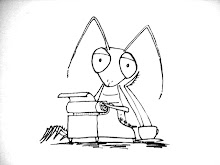
I did something rather remarkable yesterday, even instructive, if you think about it. I spent a Canadian quarter at the corner store. I'll pause briefly to let that sink in while you catch your breath.
Now I don't know how common that is in other parts of the country, or if it's more a Northern thing, since we are, after all, much closer to Canada. Still, there is a fair amount of Canadian currency in circulation here. When I was younger, some shops would refuse it. Not so much anymore. We spend it and receive it in change quite freely, just like money.
Isn't that interesting?
***************
We hear a lot about wealth these days: the government does not create wealth, we should not redistribute wealth and so forth. If we speak of the wealthy, usually we are talking about people with a lot of money. Yet we rarely hear questions such as: "What is wealth"? or "What is money?" If we are going to concern ourselves with creating wealth, perhaps it would make some sense to know precisely what it is we hope to create.
I do not mean this in some spiritual sense, where we speak of living a rich life. That is a question worth considering, of course, but I am talking about material wealth, and the question remains: what is it? What is wealth?
Note that the word itself derives from the Old English wela: meaning the common good. My dictionary defines wealth as:
1. An abundance of valuable material possessions or resources; riches. 2. The state of being rich. 3. A profusion or abundance. 4. Econ. All goods and resources having economic value.
These definitions seem to focus on material things, goods, resources. This, I think, is correct. Wealth is a property of things. Only things have inherent value.
For example, my house is real wealth. It may not be ostentatious, but it has real value outside of whatever it is worth in dollars. In fact, its dollar value is irrelevant unless I would like to sell it. In the meantime, I can live in it. I can keep my other possessions in it. It has real value. It is called real estate for good reason.
Similarly, my car is wealth. It is 11 years old and has over 100,000 miles. Even so, it has been meticulously maintained and runs well. It does everything I need it to do. It has real value.
Money, on the other hand, has little real value in itself. It is pieces of paper or discs of metal. You can't do anything with it except exchange it for some thing. It is ultimately worth only what you can buy with it. There is something quite arbitrary about it.
Some would argue that money should be, for example, gold, or at least gold-backed. Then it would have real value. This is true to a point, but even here, we have exchanged one arbitrary choice for another. It would still be money, not wealth. Its value would be determined somewhat differently, but it would still ultimately be worth only what you could buy with it. Unless you are a dentist or a jeweller, there is little you could do with the gold itself.
Wealth and money are only loosely related and their points of intersection are often problematic. How do we determine value? Again, consider my car. Its market value is practically nil. Perhaps I could sell it for a thousand dollars or so. This is fine if I choose to sell it. Presumably I would be doing so for reasons that made sense to me, whatever those were. I could sell the car, take my thousand dollars, and call it square.
On the other hand, even a small accident would "total" my car. This would be a problem. I likely could not replace it for the thousand dollars I might receive in compensation. Its value to me as a reliable, functioning car far exceeds its market value. In this case, though I would not, in theory, lose money, I would lose wealth. In reality, I would probably lose both.
Real wealth is not easily measured. It is a property of things that relates to their inherent value to the possessor. This may have little or nothing to do with market values. Money is very different from wealth.
***************
So what is money? We could say that money is a medium of exchange. What is necessary for something to become money? Agreement between the parties. That is all. Think about my Canadian quarter. It is not legal tender in the United States. The shopkeeper would have been within his rights to refuse it. Yet he did not. Neither do I refuse one in change. No one wants to be the last one holding it so it has become money. It is money because we agree that it is.
Think about that for a minute.
But this does not go far enough. It describes what money does. It does not get to the essence of what our money is.
So where does our money come from? How is it created? What does it represent? Important questions, yet ones that are rarely asked, and even more rarely answered. This process is most often vaguely attributed to government. There is an element of truth to this, but only just. It is true that governments print the actual currency we use, but this is not the same thing as creating money. It is also true that the government can create money. However, most of the money in the world was not created by governments. If you want to understand why things are the way they are, you need to understand what our money represents: what our money is.
Money is debt.
Does that sound strange? It's true. All the money in existence today represents debt. It is created by private banks. Every time a loan in made, brand new money comes into existence. Contrary to popular belief, banks do not take my deposits at interest and loan them to you at a higher rate. Instinctively, we know this. When we apply for a loan, we are never told that the bank doesn't have the money. Under the current system, the bank has, in essence, a charter from the government to create money. If a bank loans me $10,000, then $10,000 is created at that moment: $10,000 that did not exist before, backed by my promise to repay it.
Understand this and you will understand how it is that almost everyone, from private individuals, to large corporations, to national governments, seems to be in debt to banks. Furthermore, the bank creates only the principal of the loan. What about the interest? A moment's thought will reveal something startling: more money is owed to the banks than exists in the world.
Under the current system, the way a government can create money is to take on more debt. A government, in practice, has no control over the money supply. Private banks determine how much money will be available and to whom. It is often said that the banks aren't lending because the economy is bad. Almost precisely the reverse is true: the economy is bad because the banks aren't lending.
There is an even stranger corollary to this. If all debts were paid, there would be no money. The system is absolutely dependent upon the creation of debt based money in ever-increasing amounts. If this process stops, the system collapses.
Does this explain anything?
***************
Are there any alternatives? Of course. Remember my Canadian quarter? What is necessary for something to become money? Agreement among the parties. That is all. If money can literally be based on debt, it could be based on something equally abstract, such as wealth. How we might answer this question is the province of politics. But before we attempt an answer to this question, we need to absorb the answer to the first: What is money? Under the current system, money is debt and debt is money. This is not a political opinion, just a fact.
Maintaining such a system makes no sense.
When we see the state of the world today, it might appear that those in power have the wrong answers. This is true, but it does not go far enough. The problem is deeper. The problem is systemic and any real solution will first have to recognize this.
The problem is not that we cannot find an answer; the problem is we are asking the wrong question.
Respectfully Yours,
Cricket











